Trump Surges as Harris’ Lead Fades, Battleground Polls Show

Former President Donald Trump has reclaimed his lead in polling after Vice President Kamala Harris initially gained support following President Joe Biden's July decision to withdraw from the 2024 presidential race.
Harris had a month of favorable coverage from most mainstream media outlets, which generally lean left on their editorial pages, while Trump faced overwhelmingly negative reporting. Axios noted that earlier polling by the Cook Political Report last week showed Harris leading Trump in key states like Arizona, Michigan, North Carolina, Pennsylvania, and Wisconsin. Similarly, a New York Times/Siena College poll released last week found Harris with a slight edge in Michigan, Wisconsin, and Pennsylvania.
However, a newer survey by Navigator Research, released Tuesday, suggests that the race is now essentially tied in Arizona, Michigan, North Carolina, Pennsylvania, and Wisconsin. Specifically, Trump is ahead of Harris by one percentage point in Arizona (46% to 45%) and by two points in Pennsylvania (46% to 44%), while the remaining states are neck and neck.
These findings are consistent with the RealClearPolitics Polling average of battleground states, which also includes Nevada and Georgia.
Harris is performing better in these crucial states than Biden did before he exited the race last month. Before Biden's departure on July 21, Trump led by more than 4 percentage points across the seven states in the RCP average, with his advantage growing as Biden’s withdrawal became imminent.
On Monday, a prominent super PAC co-founder supporting Harris caused a stir by suggesting that public polling numbers might be inflating her support.
Reuters reported that Chauncey McLean, president of Future Forward—a super PAC that has raised significant funds for Harris’s campaign—spoke at an event in Chicago linked to the Democratic National Convention.
“Our numbers are much less rosy than what you’re seeing in the public,” said McLean, who rarely speaks publicly.
According to McLean, Kamala Harris garnered substantial support from young voters of color following Biden's withdrawal, which has rejuvenated Democratic hopes in Sunbelt states like Nevada, Arizona, Georgia, and North Carolina—states largely dismissed by Democrats during the final days of Biden’s campaign.
“She has multiple paths,” McLean said of the seven states in play, according to Reuters. He added that voters want more information about Harris's policy positions, according to internal polling. He emphasized that voters aren’t interested in "white papers" or vague statements, but rather want clear examples of how Harris plans to differentiate herself from Biden and improve their economic circumstances.
“We have [the race] tight as a tick,” McLean noted.
Meanwhile, CNN contributor and former Obama administration official Van Jones expressed concern on Monday that despite a month of glowing mainstream media coverage and avoiding a formal press conference, Harris is still essentially tied with Trump in the states they both need to win.
“We don’t wanna be tied. I don’t like being tied with Donald Trump because we’ve had now 20 plus days of positive press. He’s been falling down the stairs, slipping on banana peels and poking himself in the eyeball. We should not be tied. We want to pull ahead,” Jones said. “That’s our opportunity this week.”
Former Trump advisor David Urban agreed with Jones’s assessment, noting that despite Harris's campaign being “flawless” so far, the race remains close.
“That’s scary,” Jones responded. “That’s scary. We gotta go.”
“They’re doing the best they can, and it’s tied. That’s really important,” Urban added.
A study from the Media Research Center on Monday found that Harris and her running mate received “82% positive press,” while Trump and his running mate faced “90% negative coverage” on ABC News, CBS News, and NBC News evening broadcasts from July 21 to August 17.